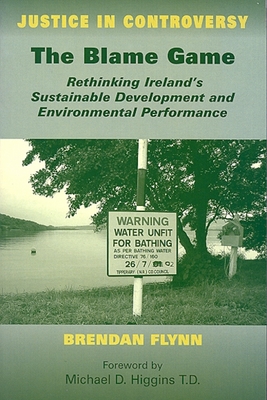The Blame Game
Roy Johnston reviews The Blame Game: rethinking Ireland's sustainable development and environmental performance by Brendan Flynn, Irish Academic Press, ISBN 0 7165 3351 0 pb €27.50/£19.50 pbk

THIS IMPORTANT books sets the agenda for the current government's Green component, in that it surveys in some depth the prior scene. Michael D Higgins TD in a foreword welcomes it as "...a model that is both possible and perhaps practical".
In the author's introductory chapter stating the problem he gives many instances of how it is treated reactively and in confrontational mode: the presistent isolated rural housing pattern, with its total dependence on vehicular access to remote services; persistent predictable pollution issues; waste 'management' by landfill; institutional failure to adapt to the need to implement EU regulations.
He shows how the emerging 'environmental policy software' does not run well on the Irish 'institutional hardware' and how the pace of policy change is not matched by the rate of institutional reform. He argues for the need to replace confrontation by the analogue of the 'social partnership' model.
The author next does a comparative study between Ireland and a 'peer group' consisting of Denmark, Greeca and Portugal. He charts greenhouse gas emissions per person, exposing the high Irish level and rate of increase, the latter being related to transport, dominated by the journey to work and lack of housing policy.
He exposes the appalling waste record, with its incineration and landfill wars and recycling for export. Container re-use is derisory, compared to the EU averages in the region of 40 to 60 per cent. In renewable energy uptake Denmark and Portugal are up in the 14 per cent region, while Ireland demains at a derisory 2 per cent.
In a chapter on the history of Irish environmental policy we encounter the foundation of an Taisce in the late 1940s by Robert Lloyd Praeger, followed by the Georgian Society in the late 1950s, concentrating on the architectural heritage.
Conservation legislation in the 1960s was modelled on that adopted by the British, under the influence of these bodies, which however got the reputation of being 'posh'. Much of their conservationist efforts were nullified by political power vested in councillors to rezone in defiance of planning regulations, in a process accompanied by serious political corruption, currently the subject of tribunal enquiry.
He goes on to cover the Carnsore Point anti-nuclear campaign, Lough Sheelin, Wood Quay, Moneypoint and Chernobyl, water charges, waste charges, fast-tracking and various other issues as they arose, most still being undesolved.
Analysing the flaws in the institutional 'hardware' Flynn homes in on the basic weakness of local government, and the regulatory ambiguity of the Environmental Protection Agency (EPA). Reform of the EPA is said to be on the Green Party agenda; we need to 'watch this space'.
Implementation of EU directives is identified as a rapidly growing problem area, with a rapidly rising tally of European Court cases -- many in the hazardous waste area.
Taxpayers will be saddled with an increasing government need to buy carbon emission credits, due to the failure actually to achieve emission reduction in accordance with the Kyoto Agreement. The incinerator agenda has been in existence since 1998, but the Health Research Board only began to look into it in 2003. Separation of clean biomass combustables in the waste stream at source, an obvious fuel resource for energy production, has never managed to emerge as a friendly alternative to mass waste incineration.
In his final chapter Flynn develops an outline reform agenda. This includes a proposal for an 'Environmental Partnership', modelled on the 'Social Partnership' approach, in which the environmental NGOs would be dealt with by negotiation rather than by confrontation.
In this context the lobbying NGOs would develop away from simply resisting threats and towards arguing for benefits. There is also need for serious local government reform, especially as regards the corrupting effects of the rezoning process.
He falls short however of arguing for the implementation of the classic Kenny Report suggestions, of which he seems to be unaware: make a compulsory purchase order on land at the agricultural price, then rezone, and lease the land to urban users at rates such as to cover municipal services. This would capture the rezoning added-value for the community, instead of allowing it to be a windfall capital gain to landowners, with which to bribe councillors to get the rezoning decision, the current corrupt practice as symbolised by the infamous 'brown envelope'.
Despite these shortcomings, he does come up with a wide range of useful and valid policies, ranging from the revised planning of the electricity grid to the role of public transport, though in his support for biofuel development he fails to pick up the need for critical analysis of the actual sustainability of the various types of biofuel, and how they interface with agriculture.
On the whole, this is a useful source book for people interested in political reforms supportive of renewable energy, sustainable economics and avoidance of the catastrophic climate change effects with which we are threatened if global economics continues to develop in 'businbess as usual' mode.
Connolly Association, c/o RMT, Unity House, 39 Chalton Street, London, NW1 1JD
Copyright © 2008 Roy Johnston

